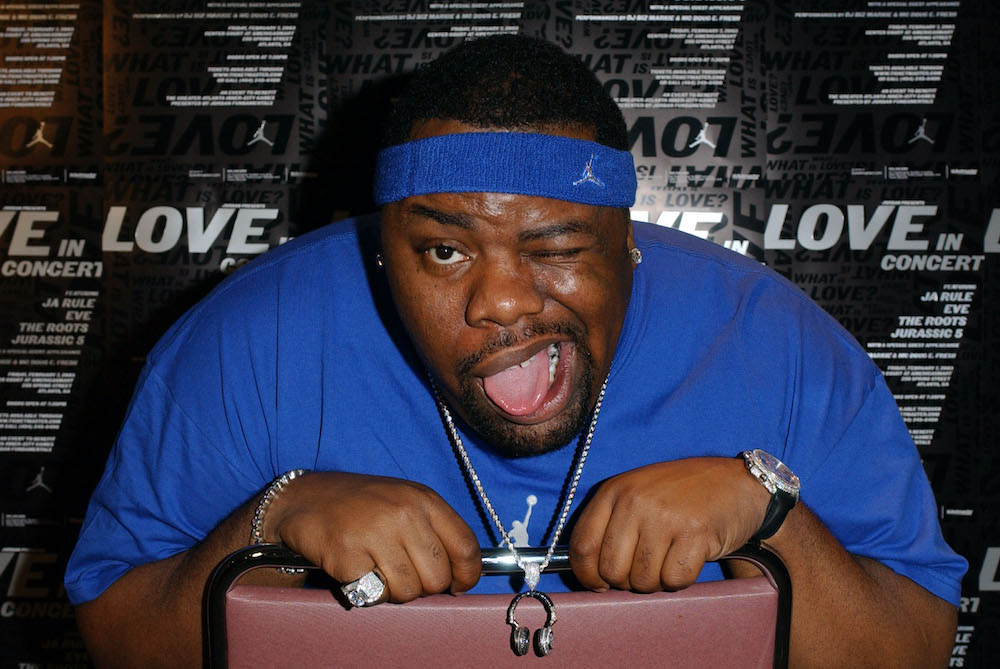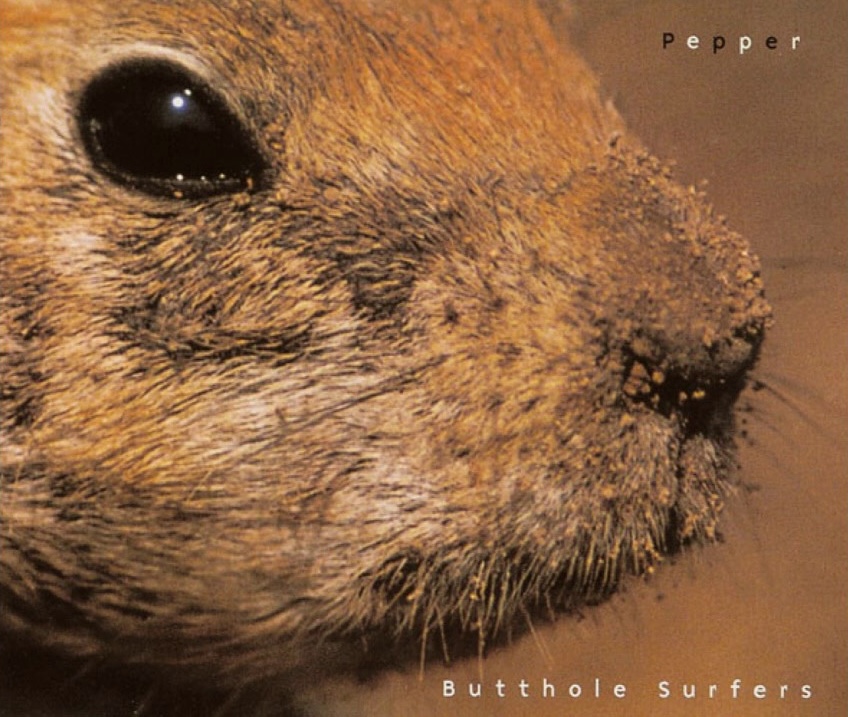It wasn't just that the Diabolical Biz Markie was funny. When the Biz made his unlikely pop-chart breakthrough in 1989 -- the first moment when a rapper really could score a pop-chart breakthrough -- every rapper who crossed over was funny, or at least "funny." It was a job requirement. Public Enemy and N.W.A and Rakim were deadly serious, and pop radio stayed away from them like their dookie ropes were made of plutonium. The rappers deemed friendly enough for radio play were the ones who ingratiated themselves, the ones who tried to be funny. Tone Lōc and Young MC told loopy stories about trying to get laid. Digital Underground's Shock G invented a whole Rodney Dangerfield character for himself. The Fresh Prince carried himself as a sitcom star long before he became one. The Fat Boys were, more or less, a vaudeville act. But Biz Markie wasn't like those other guys. Biz didn't try to be funny. Biz simply was.
When Biz Markie wrote "Just A Friend," the song that took him into the unexplored territory of the Billboard Hot 100's upper reaches in 1989, he didn't think of his single as a comedy song. Biz was rapping about a real-life heartbreak, about learning that a girl he'd been dating had cheated on him when she was in college. But Biz was not a normal human being, and he found endearingly weird ways to tell a fairly straightforward rap narrative. The way Biz put words together made no sense, and it made all the sense -- that elusive combination that we call style. "I was talking to this girl from the US nation." "I asked her her name, she said, 'Blah Blah Blah.'" "I have friends, and that's a fact, like Agnes, Agatha, Germaine, and Jack." "I arrived in front of the dormitory. 'Yo, could you tell me where is door 3?' They showed me where it was for the moment. I didn't know I was in for such an event."
For the chorus, which flips the hook of Freddie Scott's 1968 sooth-soul nugget "(You) Got What I Need," Biz intended to bring in someone who could actually sing -- probably TJ Swan, the Juice Crew-affiliated crooner who showed up on Biz tracks like "Make The Music With Your Mouth, Biz." Nobody showed up the the studio, though, so Biz brayed out his own hook in a full-on drunken-karaoke atonal howl. That chorus was so bad, so good, and so full of personality that the world couldn't help but take notice. Biz steered into it, dressing up like Mozart in the video, and the song went straight into the collective memory and stayed there for decades. Biz's off-key roar makes "Just A Friend." When a real singer tries it, the song just doesn't have the same charm. Thirteen years later, Mario, a teenage R&B singer from Baltimore, sang his own version of "Just A Friend," and he had a career-making hit with it. "Just A Friend 2002" did even better on the Hot 100 than the Biz's original. Today, though, it feels like a footnote to the Biz's original.
The vulnerability is part of the magic of "Just A Friend." It's what makes Biz both funny and relatable. Even if you hear "Just A Friend" as a joke song, and plenty did, then the Biz is the butt of his own joke -- the hopeless chump who didn't see the signs and who now has to wail out his own deliriously bummed-out song about it. Where Biz's rap peers depicted themselves as self-assured smooth operators, Biz was a human cartoon character, and his mere presence deflated the self-importance of everything around him. The first song on Biz's first album is called "Pickin' Boogers," and it's about just what the title says. At that moment, the coolest man in rap might've been Big Daddy Kane, Biz's Juice Crew colleague and occasional ghostwriter. On "Pickin' Boogers," Biz even goes out of his way to puncture the Kane mythos: "Just last night, when Kane was gettin' ready/ I slipped a little green one inside his spaghetti."
https://youtube.com/watch?v=FjJvBarVRss&ab_channel=Nervioso_xD
In an art form driven by defiant ego, Biz operated entirely without self-consciousness, fully willing to make himself look ridiculous to get a rise out of a crowd. Biz learned his sense of showmanship from the earliest days of rap music. He first encountered rap in 1978, when it was still live music that sometimes got bootlegged on cassette, and he named himself after Busy Bee Starski, the first rapper he'd ever heard. Biz didn't get his start as an MC, either. He was a human beatbox, a master of an innately goofy art form. A human beatbox simply cannot look cool. To excel at beatboxing is to send spit in all directions. Biz was great at it.
In the mid-'80s, Biz joined the Juice Crew by showing up in the Queensbridge projects every day, looking for producer Marley Marl. Finally, Marley teamed Biz up with his teenage protege Roxanne Shanté, and Biz made his debut beatboxing for Shanté on her 1986 track "Get Fresh Crew." When Biz released his debut single "Make The Music With Your Mouth, Biz" later that year, that beatboxing ability was Biz's whole hook. But he had too much personality to stick with that role. He was, quite clearly, a star. By 1988, Marley had Biz and Heavy D trading off lines, riffing on Barry Manilow and Dobie Grey, an Marley's own In Control, Vol. 1 album.
1988 is also when Biz released the Marley-produced debut album Goin' Off. That album had the single "Vapors," where Biz clearly presented himself as a serious person. But Biz was an outlandish figure, and his larger-than-life absurdity came through even on a song like "Vapors." If you listen to that album, it's clear that Biz cared about party-rocking above all else, and he got even better at it by the time he came out with the 1989 follow-up The Biz Never Sleeps. Biz didn't work with Marley on that album. Instead, along with Paul C and his cousin Cool V, Biz produced the LP himself. The Biz Never Sleeps had "Just A Friend," but that one hit didn't exactly elevate Biz Markie in the rap world. Instead, it got him deeper into his role as a party-starter and a folk hero. By the time Biz's fellow Juice Crew member Masta Ace recorded "Me And The Biz" in 1990, Biz's whole persona was so well-established that Ace could just get away with doing a Biz impression for a whole song, and by putting a Biz puppet in the video.
You'd be hard-pressed to find too many rappers as beloved as Biz Markie within rap itself. Biz's voice echoed down, though samples, in the work of other rappers. These little tossed-off bits of verbiage would become full songs, sometimes classic songs: "I'm bound to wreck your body and say turn the party out." "Damn, it feels good to see people up on it." "Now let me take a trip down memory lane." When Biz would rap alongside Big Daddy Kane, arguably the greatest rapper of his era, Kane would have to crank his personality way up just to hang with Biz. Even then, he couldn't help but be upstaged. It was impossible. How could you top Biz? Biz drank ginger ale or root beer soda. He never got the girls with the underarm odor. Put Biz on water, he's a good floater. When Biz runs for prez, you better see a voter. Once, Biz knew a girl by the name of Rhoda. Biz watched Star Wars just to see Yoda.
Biz loved music. He loved it without distinction, without reservation. The cheesiest old soft rock song from the '70s? Biz adored it. Biz sampled the Steve Miller Band and Player. He warbled Three Dog Night's "Black And White" on a Kool G Rap record. He eventually got together with the Spin Doctors to cover KC And The Sunshine Band on the Space Jam soundtrack. Among the community of people who comment on my column The Number Ones, it's a running joke that I mention Biz whenever possible. There's a reason for that. That column's Bonus Beats section -- itself named after a short beatbox track that sat next to Biz's version of "Bennie And The Jets" on a flexi that came with an issue of the Beastie Boys' Grand Royal zine -- is dedicated to all the times these past #1 hits have echoed down through pop culture. In a lot of these cases, those songs have stuck around, at least in part, because Biz Markie kept them in circulation.
Eventually, that love got Biz in trouble. On his 1991 album I Need A Haircut, Biz sampled Gilbert O'Sullivan's self-pitying 1972 chart-topper "Alone Again (Naturally)." O'Sullivan -- who either saw a way to get money or who mistook Biz's affectionate tribute for mockery -- sued, and he won. From that moment on, rappers couldn't sample without paying exorbitant fees to clear those samples. Biz even had fun with that. He named his next album All Samples Cleared!, and he posed for the album cover in a powdered wig and a judge's robe.
By the time All Samples Cleared! came out, rap had moved on from Biz's antic sense of fun, and he didn't quite fit in anymore. This did not seem to bother the Biz. He adjusted. Biz moved to Maryland and bought a big house that he filled with the toys and sneakers that he collected. He showed up in records from old '80s-rap contemporaries like the Beastie Boys and Will Smith. The generations of rap moguls who came up in the '90s clearly admired Biz, too. Jay used Biz on the hook of his 2001 single "Girls, Girls, Girls," and I've never heard Diddy sound happier than he did playing hypeman on Biz's 2003 track "Do Your Thang."
Biz Markie found ways to thrive as the world moved on, and he found that the party-rocking skills he'd perfected still worked in a couple of different lines of work. Biz became a DJ, pulling in big and euphoric crowds. And after he made a cameo in 2002's Men In Black II, playing an alien who communicated with old rap comrade Will Smith entirely through the language of beatboxing, Biz became a kind of children's entertainer. Biz joined the Wild 'N Out cast. He played voice roles on SpongeBob SquarePants and Adventure Time. Most famously, he had his own recurring segment beatboxing on Yo Gabba Gabba.
https://youtube.com/watch?v=ql09PwVN4yg&ab_channel=YoGabbaGabba%21-WildBrain
Biz suffered from health problems for the final years of his life, and those health problems finally took him this past week. Biz was 57 when he died -- one more glaring loss in a year full of them. The number of rappers who have died in middle age, just in the past few months, has been staggering. 2021 began with the news that MF DOOM had passed. Since then, we've said goodbye to DMX, Shock G, Black Rob, Prince Markie Dee, and the Gift Of Gab, among others. These artists haven't died of violence or misadventure. The circumstances are all different, but they've all died, in early middle age, of health problems -- the same health problems that affect way too many Black Americans. This is a bleak sign of the prolonged effects of institutional racism. Research shows that the stress associated with being part of an oppressed culture has severely negative health effects. Even when people find success, even when they become beloved public figures, they can't always overcome those effects. Biz Markie was great, and Biz Markie deserved better.
FURIOUS FIVE
1. Kool G Rap & DJ Polo - "Erase Racism" (Feat. Biz Markie & Big Daddy Kane)
2. DJ Kool - "Let Me Clear My Throat (Old School Reunion Remix '96)" (Feat. Biz Markie & Doug E. Fresh)
3. Funkmaster Flex - "Nuttin' But Flavor" (Feat. Charlie Brown, Ol' Dirty Bastard, & Biz Markie)
4. De La Soul - "Lovely How I Let My Mind Float" (Feat. Biz Markie)
3. Def Squad - "Rhymin' Wit' Biz" (Feat. Biz Markie)
IT WAS ALL GOOD JUST A WEEK AGO
‘Reagan Is The Prez but I voted for Shirley Chisholm’ ..Nobody Beats The Biz Yes Bizmarkie spit line even though I think it was written by @bigdaddykane set me off on a political lyrical path style for Rebel Without A Pause. Notice the records both start with Marv & Bizs YES! RIB pic.twitter.com/l78eAD85XU
— Chuck D (@MrChuckD) July 17, 2021
He was always a funny dude. A true pioneer! Rest in Power #BIZMARKIE ? pic.twitter.com/gmLSCyYTFd
— Reagan Youth (@ReaganYouthBand) July 17, 2021
https://twitter.com/Dispactke/status/1416354331608207363
Biz Markie on In Living Color….both him and Jamie Foxx broke character ? #RIP pic.twitter.com/gyuisLslGY
— KSB-One™️ (@VoteForKB) July 17, 2021
Biz Markie battlin’ a b-boy. Always putting a smile on our faces! #nobodybeatstheBiz
— Rock The Bells (@RockTheBells) July 17, 2021
We love you, Biz ❤️?
Credit: @ClaudineJoseph pic.twitter.com/xjyRJkyCh6
When Tip & Phife starting doing
— MichaelRapaport (@MichaelRapaport) July 17, 2021
The Biz Dance in rehearsal, I knew we had the end of our movie.#BizMarkie pic.twitter.com/HyaE7nMQmR






